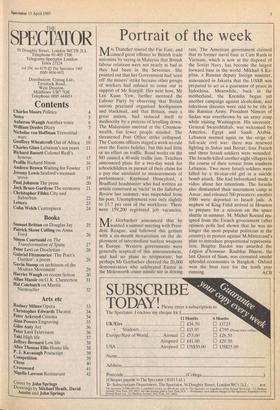Portrait of the week
Mrs Thatcher toured the Far East, and caused great offence to British trade unionists by saying in Malaysia that British labour relations were not nearly as bad as they had been in the Seventies. She pointed out that her Government had 'seen off' the miners' strike because other groups of workers had refused to come out in support of Mr Scargill. Her next host, Mr Lee Kuan Yew, further incensed the Labour Party by observing that British unions practised organised hooliganism and blackmail, and that Britain, once a great nation, had reduced itself to mediocrity by a process of levelling down. The Malaysians sneered at the Common- wealth, but fewer people minded. The threatened Post Office strike collapsed. The Customs officers staged a work-to-rule over the Easter holiday, but this had little or no effect on traffic. Road works on the M1 caused a 40-mile traffic jam. Teachers announced plans for a two-day week for schoolchildren in pursuit of their claim for a pay rise unrelated to measurements of performance. Raymond Honeyford, a Bradford headmaster who had written an article construed as 'racist' in the Salisbury Review last summer, was suspended from his post. Unemployment rose only slightly to 13.7 per cent of the workforce. There were 159,200 registered job vacancies.
Mr Gorbachev announced that he wanted a summit meeting with Presi- dent Reagan, and followed this gesture with a six-month moratorium on the de- ployment of intermediate nuclear weapons in Europe. Western governments were generally sceptical of this announcement, and had no plans to reciprocate; but perhaps Mr Gorbachev cheered the 20,000 demonstrators who celebrated Easter at the Molesworth cruise missile site in driving rain. The American government claimed that its former naval base at Cam Ranh in Vietnam, which is now at the disposal of the Soviet Navy, has become the largest forward base in the world. Mikhail S.Ka- pitsa, a Russian deputy foreign minister, announced in Jakarta that the USSR was prepared to act as a guarantor of peace in Indochina. Meanwhile, back in the motherland, the Kremlin began yet another campaign against alcoholism, and infectious diseases were said to be rife in the Russian Army. President Nimeiri of Sudan was overthrown by an army coup while visiting Washington. His successor, General Swareddahab, was welcomed by America, Egypt and Saudi Arabia. Lebanon seemed again on the verge of full-scale civil war: there was renewed fighting in Sidon and Beirut; four French and three Israeli soldiers were wounded. The Israelis killed another eight villagers in the course of their retreat from southern Lebanon. Two more Israeli soldiers were killed by a 16-year-old girl in a suicide bomb attack. She had beforehand made a video about her intentions. The Israelis also dismantled their internment camp at Ansar, and released 760 prisoners: another 1000 were deported to Israeli jails. A nephew of King Fahd arrived in Houston to prepare for a mission on the space shuttle in summer. M. Michel Rocard res- igned from the French government (after opinion polls had shown that he was no longer the most popular politician in the country) in protest against M.Mitterrand's plan to introduce proportional representa- tion. Brigitte Bardot was awarded the Legion d'honneur. Raubhai Bharni, the last Queen of Siam, was cremated amidst splendid ceremonies in Bangkok. Oxford won the boat race for the tenth year














































 Previous page
Previous page